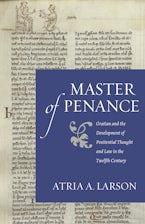- Home
- Studies in Medieval and Early Modern Canon Law
- religion
- Master of Penance
Preparing your PDF for download...
There was a problem with your download, please contact the server administrator.
Master of Penance
Gratian and the Development of Penitential Thought and Law in the Twelfth Century
Studies in Medieval and Early Modern Canon Law
by Atria Larson
Imprint: Catholic University of America Press
This book presents the first full-scale study of the Tractatus de penitentia (C.33 q.3) in Gratian's Decretum, which became the textbook for canon law and served as the basis of the church's developing jurisprudence, in theory and in practice. The treatise on penance stands out as a distinct, overtly theological section of Gratian's work and was long suspected of being a later addition to the Decretum. As a result, the treatise has not received thorough treatment and has often not been included in scholars' general discussions of Gratian's work, its nature, and its purpose. Manuscript discoveries in the 1990s proved the treatise to be authentic and to be part of Gratian's early drafting of his text. This study examines the treatise in its entirety, providing a commentary on the content of the treatise (which extends beyond questions of penance) and an examination
of its relationship to the early twelfth-century schools, positing above all a connection to the school of Anselm of Laon. The study also re-examines the question of the nature and purpose of Gratian's Decretum in light of the original inclusion of De penitentia and of Gratian's role as a teacher, or master.
The second half of the book traces the influence of De penitentia in the second half of the twelfth century and through the pontificate of Innocent, culminating in the Fourth Lateran Council (1215). That period was crucial for the development of systematic theology and ecclesiastical jurisprudence. Nevertheless, the period was also one in which boundaries between academic fields were far from solidified, which the treatment of De penitentia by various intellectuals demonstrates. The period witnessed as well the development of new kinds of penitential literature and an increase of business at the papal curia. Gratian's De penitentia exercised influence in both realms. In brief, Gratian's De penitentia constituted the fundamental text on penance in the period.
ATRIA A. LARSON is a Visiting Scholar in the Center for Medieval and Renaissance Studies at Saint Louis University.
"This is an extremely well-researched and well-presented study that is informed by meticulous textual analysis from the manuscripts...Yet this book goes even further in that Larson asks the reader to consider the development of both theological and legal thought in the second half of the twelfth century...a splendid achievement, and Larson is to be both thanked and congratulated on such a stimulating book."
~American Historical Review
"By focusing on a rather neglected part of Gratian’s masterwork, Master of Penance illuminates the fascinating world of twelfth-century intellectual life from an unexpected angle and is a real contribution to our knowledge of Gratian, penance, and the intellectual life of the long twelfth century in general."
~Catholic Historical Review
"A significant contribution to Gratian studies. It will appeal to scholars of canonical history and sacramental theology. It also makes an important segment of Gratian’s work accessible to canonists who do not have the opportunity to work through the Decretum on their own."
~Jurist
"This exciting, tightly-packed volume explores a neglected dimension of Gratian’s educational background and intellectual accomplishments...It will be important for those at the graduate level and above working in twelfth-century canon law and theology."
~Religious Studies Review
"For the sacramental theologian and the medieval historian, especially of the liturgy and canon law, this book is a must-have."
~Michael S. Driscoll, Worship Magazine
""This substantial, monographic treatment of Gratian’s treatise De penitentia comes at a propitious moment.... Dr. Larson’s careful, well-documented, and rigorously critical sifting of the evidence... provides an invaluable basis for further scholarly investigations and arguments. There is nothing comparable published in any language."—Joseph W. Goering, professor of history, University of Toronto"


